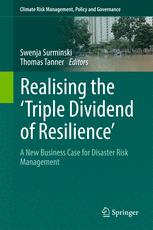

Most ebook files are in PDF format, so you can easily read them using various software such as Foxit Reader or directly on the Google Chrome browser.
Some ebook files are released by publishers in other formats such as .awz, .mobi, .epub, .fb2, etc. You may need to install specific software to read these formats on mobile/PC, such as Calibre.
Please read the tutorial at this link: https://ebookbell.com/faq
We offer FREE conversion to the popular formats you request; however, this may take some time. Therefore, right after payment, please email us, and we will try to provide the service as quickly as possible.
For some exceptional file formats or broken links (if any), please refrain from opening any disputes. Instead, email us first, and we will try to assist within a maximum of 6 hours.
EbookBell Team

4.0
26 reviewsWhy aren’t we investing more in disaster resilience, despite the rising costs of disaster events? This book argues that decision-makers in governments, businesses, households, and development agencies tend to focus on avoiding losses from disasters, and perceive the return on investment as uncertain – only realised if a somewhat unlikely disaster event actually happens.
This book develops a new business case for investment based on the multiple dividends of resilience. This looks beyond only avoided losses (the first dividend) to the wider benefits gained independently of whether or not the disaster event occurs. These include unleashing entrepreneurial activities and productive investments by lowering the looming threat of losses from disasters and enabling businesses, farmers and homeowners to take positive risks (the second dividend); and co-benefits of resilience measures beyond just disaster risk (the third dividend), such as flood embankments in Bangladesh that double as roads, or wetlands in Colombo that reduce urban heat extremes.